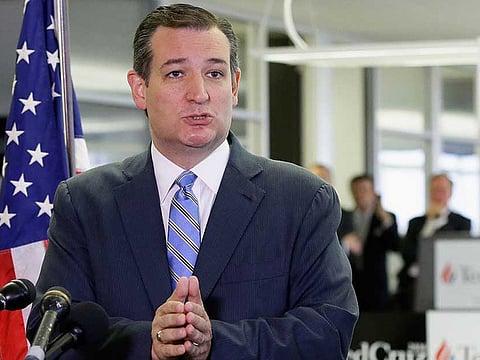Middle East at the centre of GOP debate
A key headache for the Republican party is that there is no sign yet of one or more credible candidates ‘breaking out’

The Republicans host their penultimate US presidential debate this year today with international issues, including US foreign policy in the Middle East, at the fore. Around one year from election day, the party’s contest is entering a critical phase in the bid to find a credible candidate to beat the de facto Democratic nominee Hillary Clinton next year.
One of the key issues that will influence Republican prospects of defeating Hillary (in the very likely event of her becoming the Democratic standard-bearer, now that Vice-President Joe Biden has decided not to enter the race) will be whether, and how quickly, the party can unite around its own nominee given the large amount of contenders. A model here for Republicans is the 2000 election cycle when George W. Bush emerged strongly from a wide field of players before defeating Al Gore.
A key headache for the party now, however, is that there is no imminent sign yet of one or more credible candidates ‘breaking out’ from the field. The top 10 Republicans who have ‘qualified’ for the Colorado debate are businessman Donald Trump; former Hewlett Packard CEO Carly Fiorina; former Florida governor Jeb Bush; former neurosurgeon Ben Carson (who is now leading some state polls in the first nominating state of Iowa); Governors Chris Christie and John Kasich; Senators Ted Cruz, Marco Rubio and Rand Paul; and former Governor Mike Huckabee. Meanwhile, there will be an ‘undercard debate’ featuring Governor Bobby Jindal, Senator Lindsey Graham, former senator Rick Santorum and former governor George Pataki.
This still-large field is a key factor that has allowed Trump to maintain a lead in many national polls of Republicans since the summer. The businessman is a divisive figure who, while popular with some of the Republican base, repels many centrist voters and key voting groups including Latinos. In what appears to be his ‘last best shot’ at winning the Republican nomination, the 69-year-old is going all out to win, generating much controversy in the process, with a partly self-financed campaign from his multi-billion dollar fortune.
On key international issues, including US foreign policy in the Middle East, Trump has not shied away from criticising ‘establishment Republican’ positions. For instance, he condemned some of his rivals seeking the party’s nomination for wanting to “start the Third World War over Syria” in light of their opposition to Russia’s air strikes in the country. Trump supports Moscow’s actions, purportedly against Daesh (the self-proclaimed Islamic State of Iraq and the Levant) terrorists, which has alarmed the US military and President Barack Obama has warned that the Russian campaign risks pulling its forces into a “quagmire”.
Trump also re-asserted on Sunday that the US interventions in Iraq in 2003 and Libya in 2012 were misguided. He said that it was wrong “to tell people who have had dictatorships or worse for centuries how to run their own countries”, and that “Libya’s is a catastrophe. Iraq is a disaster. Syria is a disaster”.
While some of Trump’s positions on the Middle East are shared widely internationally. His views on foreign policy are much more polarising and controversial, including his anti-migrant rhetoric. This includes his pledge to build an approximately 2,000 mile (3,219km) “permanent wall” on the Mexican border with the US, which has been slammed by some other candidates.
Trump’s positioning on this issue comes despite the fact that he criticised the 2012 Republican nominee Mitt Romney for being too harsh on immigration.The ‘Trump problem’ for Republicans is underlined by recent head-to-head polls, which largely show other leading candidates — including Carson, Bush and Fiorina, all beating Hillary. Conversely, such match-up polls pitting Trump with the former secretary of state show the opposite pattern, with her besting him.
This underlines that while Trump is less electable against Hillary, he could persist in the Republican race well into 2016 and his eventual emergence as the nominee cannot be completely dismissed. A sustained Trump insurgency may make it much harder to re-unify the party in the decisive way needed in 2016 and thus prove a similar scenario to 2012 when Mitt Romney struggled to impose intra-party discipline around his bid against Obama.
The past few decades of US political history indicates the victor in nomination contests for both major parties usually leads national polls of party identifiers on the eve of Iowa, the first presidential nomination ballot, and also raises more campaign finance than any other candidate in the 12 months prior to election year.
On both the fundraising and national poll measures this time around, Hillary will win out and is the overwhelming favourite for Democrats. But the picture is significantly more uncertain for Republicans.
After two presidential terms of a Democrat in the White House, many Republican operatives are keen to avoid another bruising, introspective and drawn-out contest that exposes significant division to the electorate. The last few times such a scenario unfolded the Republicans lost the general election, including in 2012.
Indeed, Hillary’s husband Bill benefited from this same dynamic in 1992 and went on to win a relatively comfortable victory in that year’s election. While the circumstances of 2016 will be different from 1992, and indeed 2012 previous years, it is nonetheless the case that another divisive Republican nomination contest would probably only benefit the Democrats and potentially be a tipping point, in a very tight general election contest.
Andrew Hammond is an Associate at LSE Ideas (the Centre for International Affairs, Strategy and Diplomacy) at the London School of Economics, and a former US Analyst at Oxford Analytica.
See also A2 Page 3


